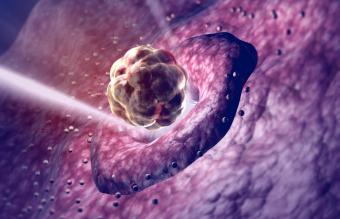
Endometriosis symptoms may not be the same in every woman, which is why many women do not pick up on the fact that they are suffering from this condition until they receive an official diagnosis.
What Is Endometriosis
Endometriosis affects over five million females in North America, with millions more diagnosed across the rest of the world. It is a condition in which tissue that is similar to the lining of the uterus presents itself in other areas of the body, like the abdomen, bowel, vagina, rectum, fallopian tubes, and ovaries. The tissue generally turns into lesions that are affected by the menstrual cycle, much like the lining of the uterus. Inflammation and shedding can result in bleeding and cause pain and infertility, along with scar tissue and other problems.
Early Stages
Endometriosis symptoms in the early stages of this disease can often be mistaken for other common ailments, such as menstrual pains or back aches. Because of this, the idea that they may have this condition may not occur to many women. After a period of time, however, these common symptoms will become progressively worse.
Not all women experience the early symptoms of endometriosis. For women who have always experienced discomfort and pain during their periods, the signs of endometriosis may be overlooked. Some women are totally free of any symptoms...at least during the early stages. In many cases, a diagnosis is only made in the early stages because the endometriosis has been found during surgery for some other issue.
Understanding Endometriosis Symptoms
Because there are so many, varied endometriosis symptoms, some physicians may not pick up on the condition in a woman when she first begins to complain of discomfort. Many of the symptoms associated with endometriosis are also indicative of other problems, like the following:
- Fibroid tumors
- Pelvic Inflammatory Disease
- Irritable bowel syndrome
- Ovarian cysts
- Ectopic pregnancy
- Appendicitis
- Ovarian cancer
- Colon cancer
One of the possible causes of infertility is also endometriosis and, with surgery, the chances of a successful pregnancy could be increased.
Common Symptoms
There are several common symptoms associated with endometriosis. If you experience any of these, particularly if they become progressively worse, you may want to contact your doctor. Common endometriosis symptoms include the following:
- Headaches
- Low grade fever
- Low blood sugar
- Anxiousness
- Lower back pain
- Fatigue
- Pain during intercourse
- Diarrhea
- Constipation
- Pelvic pain
- Painful bowel movements and/or urination
- Infertility
As endometriosis progresses, cysts can form. These cysts can obstruct the normal functions of other organs, particularly in the pelvic area. When this occurs, a woman may experience digestive problems, urinary infections, constipation and bowel obstructions, among other issues. The presence of endometriosis can also affect the immune system, leaving women vulnerable to other health problems as well. Chronic fatigue syndrome, fibromyalgia, and rheumatoid arthritis are just some of the health problems women with endometriosis often face. Research also indicates a connection between women who have endometriosis and allergies, chemical sensitivities, and yeast infections.
Diagnosis of Endometriosis
Doctors cannot rely on symptoms alone to diagnose the condition. They often look at family history as well as any history of pelvic pain and infertility before doing further testing. In most cases, your doctor will order a laparoscopy, which is a minor surgical procedure, to determine the extent of your condition. This process can typically show the size and the location of the endometriosis. For more questions concerning this topic, however, contact your physician.







